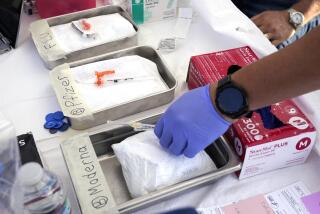USDA Proposes a New Way of Dealing With Biotech Crops : Agriculture: By simplifying the permit process, firms would have an easier time field-testing their products.
- Share via
The U.S. Department of Agriculture on Friday proposed a new system for dealing with genetically engineered crops that would make it easier and less costly for companies to field-test their products.
Under the plan, the agency would no longer require that companies receive specific permits to grow or move their crops. Instead, companies could simply notify the agency of field-tests, providing their products met certain guidelines.
The proposal puts the Agriculture Department in step with the Food and Drug Administration, which last May said it would not seek to regulate most genetically engineered food products, providing certain safety standards were met.
And while a biotech industry trade group applauded the proposal, critics of the industry blasted the decision as “grossly negligent and illegal.”
The government said the proposal would eliminate nearly 85% of the applications for permits it now processes and allow it to “focus its limited resources on the more complex permit applications.”
Under the current system, it can take as long as four months and cost up to $5,000 for companies to receive permits to field-test genetically modified plants. The new system will cut the costs by as much as 90%, the government said. In the last five years, the agency has issued more than 300 permits for field-tests of such crops.
Based on those experiences, “we can now simplify the approval process for field-tests of genetically modified plants and still make sure that field-tests are conducted safely,” Ann M. Veneman, deputy secretary of agriculture, said in announcing the proposal.
The new policy would apply to six crops--corn, cotton, potatoes, soybeans, tobacco and tomatoes--that together account for nearly 85% of all permit applications.
In addition, the agency said that researchers could file a petition asking that a particular genetically modified plant be exempted from further regulation. Earlier this month, the USDA made such a ruling in favor of a tomato developed by Calgene of Davis, Calif.
“The new system takes advantage of the massive body of scientific information that demonstrates that genetically modified crops are safe,” Richard Godown, president of the Industrial Biotechnology Assn., said in a statement. “It will mean that people who can benefit from new biotechnology products will be able to do so that much sooner.”
The proposal must be published in the Federal Register, followed by a public comment period, before it can be adopted.
Biotech critic Jeremy Rifkin said his group, the Pure Food Campaign, will file a legal comment to oppose the policy change.






